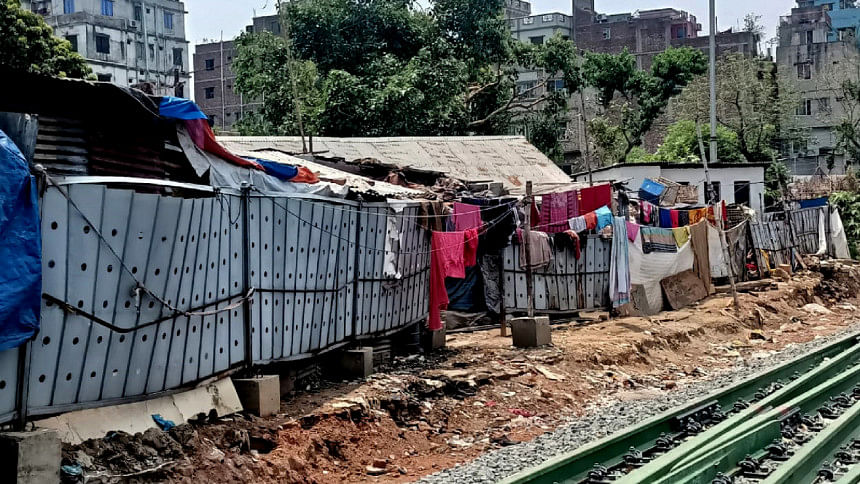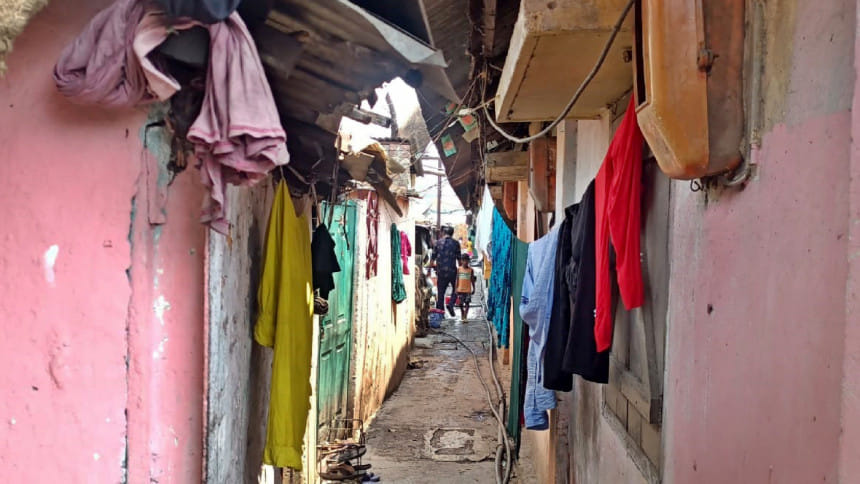TT Para Sweeper Colony: Evicted without notice, rehabilitation

"We lived in Bangladesh for about two hundred years. Yet, we don't have a house to live in. The government evicted us from our place for various development projects," said Gotala Ramalamma, a resident of South Kamlapur Railway Colony (popularly known as Gopibagh TT Para sweeper [Harijan and Telugu] colony).
K Lakhsmi, another senior resident of the colony, said, "At first, we had a place next to the Phulbaria railway station. Then we had to move away due to the establishment of Nagar Bhaban. Now they are evicting us from here again for the railway line of Padma Bridge."
"Now we don't know where to go. No one rents us a place to live outside the colony. Where will we go?" she questioned.
In 1835, the ancestors of those living in this colony were brought to Bangladesh from India by the British. Since then, they have been working as cleaners in Dhaka and other districts for generations.
The Harijan community used to work under the railway authorities. They lived in the area adjacent to Phulbaria's old railway station. They moved to this colony 42 years ago.

Locals said recently, residents of TT Para Railway Harijan and Telugu Sweeper Colony are being evicted for the construction of a rail line from Kamalapur to Jashore and related underpasses, overpasses, depots etc, under the Padma Bridge Railway Project.
In the first phase in 2019, 112 families were evicted. At that time, the project authorities prepared a list of the families and assured them of their rehabilitation. However, to date, no initiative has been taken to rehabilitate them.
At that time, the old Shitala temple located there was also demolished. Later, 27 more families were evicted last December. Project officials verbally told them that 40 more families would be evicted at any time.
On January 22, Nirmal Chandra Das, secretary general of Bangladesh Harijan Oikya Parishad, said the railway authorities and those associated with the Padma Bridge railway project carried out evictions at the Gopibagh railway sweeper colony.
Around 55 Harijan houses were demolished and 35 houses were partially demolished. Since then, they have been living a miserable life.
"Before the eviction, they were told that we would be rehabilitated and then evicted. But we were evicted without rehabilitation. This is unfair," said Nirmal.
Bijoy Das and Ripon Das, two locals, said, "No one rents a house to us. That's why we have three or four families living in one house after the eviction started. This cannot be our lives."
Pantia Ramu, president of Udayan Jubo Sangha, a local social welfare organisation, said, "Before the eviction, people involved with the project held several meetings with us and took everything, including names, pictures, and signs. At that time, we were told that we would be rehabilitated and compensated elsewhere and then evicted. But they did not keep their word and we were evicted suddenly without notice."
In this regard, Md Afzal Hossain, project director of the Padma Bridge Rail Link, said, "Most people are living here illegally. Many of them are retired from the railway service, many of them work for the city corporation and most of them work in private companies. I ensured that those who are living legally in the colony will be rehabilitated. A building is being prepared for them in Shahjahanpur Railway Colony. We will shift them there as soon as possible."
Meanwhile, leaders of Bangladesh Hindu Buddhist Christian Oikya Parishad and Mahanagar Surbojanin Puja Committee visited the colony yesterday and spoke to residents.
Manindra Kumar Nath, joint general secretary of the organisation, said, "Eviction without rehabilitation is illegal and inhumane. Those who have been living in this city for two hundred years must be rehabilitated."

 For all latest news, follow The Daily Star's Google News channel.
For all latest news, follow The Daily Star's Google News channel. 



Comments